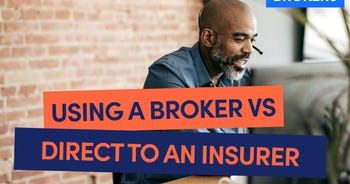Business Insurance FAQs: Your most asked questions, answered by our insurance team
As a small business owner, it’s never easy knowing your next move. Whether you’re hiring more employees at your premises, launching a startup from your kitchen table or taking your freelancing full-time, understanding the ins and outs of business insurance is key.
At Bionic, we know business insurance can seem confusing. That’s why we’ve gathered the most common questions our customers ask us and consulted with our knowledgeable insurance team to provide you with clear, reliable answers.
Our methodology
We compiled our list of the most asked business questions using the highest-ranking search engine data and utilising internal data questions asked by our insurance customers.
Questions about business insurance
There’s a whole host of business insurance questions that are probably swirling through your mind as a small business owner, but the main one we see is:
What insurance do I need?
Now, there isn’t one answer for everyone, as there are loads of different insurance options that your business might need. Remember, no two businesses are the same! What might work for a takeaway isn’t necessarily the same as a small, independent shop on the local high street.
As a general rule of thumb, there’s legally only two types of insurance you must have in place to operate your business in certain circumstances: employer liability insurance and commercial vehicle insurance.
If you employ staff, you’re legally required to have employers' liability insurance, even if they work on a casual or temporary basis. This covers any claims made by employees if they’re injured or fall ill while working for you.
Business car or commercial vehicle insurance covers any vehicles your company uses for business purposes, and you won’t be covered if you just use regular car or vehicle insurance. Unfortunately, we can’t help you with your vehicle insurance at Bionic, but we can help you with other types of cover – see the full list below!
Although not law, if you work in professional services, like accountancy, you may be required to take out a certain level of professional indemnity insurance.
Find out more about what insurance you need for your business with our guide.
Other Business Insurance FAQs
Let’s break down some of our other most asked business insurance questions.
What insurance cover does Bionic offer?
At Bionic, we offer a wide range of business insurance cover that can be tailored to your small business and trade. Not all businesses will need every option, but we are able to offer the following:
| Type of Insurance | Coverage Details | Suitable For |
| Public Liability Insurance | Covers legal costs and compensation claims if your business activities cause injury to a third party or damage to their property. | Businesses that interact with the public, such as shops, coffee shops, and tradesmen, to name a few. |
| Product Liability Insurance | Covers legal costs and compensation if a product your business sold, manufactured, or designed causes injury or damage. | Manufacturers, wholesalers, retailers, and businesses involved in the production or sale of goods including food and beverages. |
| Commercial Property Insurance | Protects the physical assets of your business, including buildings, equipment, and inventory, against risks like fire, theft, and natural disasters. | Businesses that own or use a physical premises for business use. |
| Professional Indemnity Insurance | Protects against claims of negligence, bad advice, or mistakes in professional services. Covers legal costs and any compensation awarded. | Professionals offering advice or services, such as consultants, accountants, and architects. |
| Business Interruption Insurance | Provides compensation for lost income and operating expenses if a business is unable to operate due to an insured event, like fire or flood. | All businesses, particularly those with physical premises or reliant on continuous operations. |
| Stock and Contents Insurance | Provides coverage for your business stock and contents against risks like theft, fire, and damage. This ensures you can replace stock quickly if disaster strikes. | Retailers, wholesalers, and any business that holds significant stock or inventory. |
| Commercial Landlord Insurance | Protects the business premises that you own, whether you're using them or renting them out to others. | Anyone that owns a commercial building and rents it out for business or commercial use. |
| Equipment Breakdown Insurance | Protects your business against losses if expensive equipment and machinery gets stolen or damaged by an insured event. | Any business that has expensive equipment critical for business operations. |
| Loss of License Insurance | Protects your business if your license to sell alcohol is revoked for reasons beyond your control. | All businesses that sell alcohol, like a licensed newsagents', for example. |
| Cover For Fixtures and Fittings | Provides cover for any fixtures and fittings that you have spent your own cash on in order to improve your business. | Any business with a premises, including takeaways, shops, warehouses, pubs and more. |
| Legal Expenses | To cover the cost of the legal expenses of any claims you make or that are made against you. | Any business at risk of claims from the public, employees or clients. |
| Cyber Insurance | Covers the costs associated with data breaches and cyberattacks, including legal fees, notification costs, and business interruption. | Businesses handling sensitive customer data or relying heavily on digital operations. |
What are some basic business insurance terms customers should know?
When you start exploring business insurance, there are a few terms that you’ll see popping up time and time again. Understanding these can help you grasp your policy’s scope and limitations, making sure you get the right cover possible for your business.
- Premium — This is the amount you pay to your insurance provider to keep your policy active. Premiums can be paid monthly, or annually, depending on the agreement with your broker. At Bionic, we offer both monthly and annual policies and we can also take care of your renewal for you.
- Coverage — This refers to the range of protection provided by your insurance policy against various risks, from property damage to legal liability.
- Limit— This is the maximum amount an insurer will pay under a policy for a covered loss.
- Excess — The deductible is the amount you agree to pay out of pocket before your insurance kicks in. Opting for a higher excess might lower your premiums, but it means paying more upfront if you have to make a claim.
- Policyholder — That’s you - the person or entity owning the insurance policy.
- Exclusion — These are the conditions under which your insurer will not provide cover. Knowing what’s excluded is just as important as knowing what’s covered.
- Claim — A claim is a formal request by you, the policyholder, to your insurer for payment based on the terms of your insurance policy.
Do you need insurance if you work from home?
Yes, working from home doesn’t necessarily shield you from the professional risks you’d find in an office space or warehouse.
Whether you deal with client data, sell a product online, or even have business-related home visits — such as running a nail business from home on the weekends — various situations could expose you to financial risks.
Find out more about insurance when working from home.
Do I need insurance for an online business?
The increasing power and reach of the Internet have allowed online stores to flourish in recent years — in fact, the number of online retailers grew by 82,000 in 2023!
But, running an online business that has no physical premises comes with its own unique set of risks. If you’re managing an online-only business, you will need some form of online retailer insurance. Say you’re selling homemade cakes, for example, you still run the risk of making a customer ill, so it’s a good idea to have product liability insurance.
Get in touch with our knowledgeable insurance team to find the right insurance that fits by starting a quote online today.
Do I need insurance if I’m just starting my business?
Starting out, insurance might seem like an added expense, but it’s a good idea to consider from day one. Suitable cover can safeguard your business against unexpected events like:
- Property damage — What if someone throws a brick through your window?
- Lawsuits from dissatisfied customers — What if you damage someone’s expensive clothes?
- Accidents that harm someone — What if a member of the public slips over on your property?
Getting insured early on can be a lifeline that keeps your business afloat during challenging times.
Do you need insurance as a freelancer?
Being your own boss brings about a lot of freedom, but navigating the world of freelancing is not always easy.
Whether you’re a freelance consultant, tutor or creative, working for yourself brings risks with rewards. Accidents happen, but as a freelancer, if something goes wrong, you can face major compensation claims from a client.
As a general rule, most freelancers have some sort of insurance in place. Professional indemnity insurance is generally a good idea for freelancers.
Do you need insurance for a side hustle?
Even side hustles can be exposed to financial risk! Every business, from a home-based personal trainer to a person selling gifts online, needs to be protected. The right insurance policy covers you against lawsuits, accidents and other unforeseen mishaps that could shut your side hustle down before it’s even found its feet.
How does Bionic choose its panel of insurers?
Our panel of trusted insurers are handpicked by our insurance team. We only work with providers that can offer quality coverage to our customers.
Your business insurance questions, answered by Bionic
Navigating business insurance doesn’t have to be complicated! With the right information and trusted partner, you can find the right cover that protects what you’ve worked so hard to build.
Bionic is the comparison site for your small business. Get in touch with us today to compare business insurance quotes or head over to our business insurance guides to find everything there is to know about sorting your insurance.








